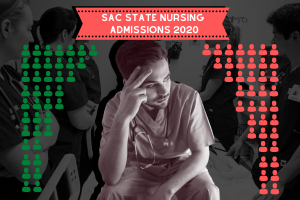Nursing students urge Sac State to cover tuition for classes missed in pandemic
Students seek $1,850 in summer expenses
Nursing students at Sacramento State sent a letter addressed to Sac State President Robert Nelsen on Wednesday, May 12, 2021, asking for the university to pay for their summer tuition for classes the cohort was previously unable to take due to COVID-19. In order to take the courses this summer, each student will have to pay $1,850 in tuition “out of our own pockets,” the students wrote. Graphic created in Canva.
May 14, 2021
Sacramento State nursing students sent a letter to Sac State President Robert Nelsen on Wednesday asking for the university to pay for their $1,850 worth of summer tuition for classes the cohort was previously unable to take due to COVID-19.
“On behalf of the 80 students in the Fall 2021 Sacramento State Nursing Cohort, it is imperative to our education that our summer tuition is paid for,” the letter reads. “In March of 2020, nursing students were kicked out of our clinical rotations and unable to complete our course work in the projected timeline established by the School of Nursing.”
The hospitals that were holding the clinical placements did not want students in the hospitals due to concerns about the COVID-19 pandemic, according to the nursing students who wrote the letter, so many Sac State nursing students were not able to complete their clinical placements.
In order to take the courses this summer, each student will have to pay tuition “out of our own pockets,” the students wrote, saying this has impacted their ability to meet their nursing objectives to graduate on time and financially provide for themselves and their families.
The nursing cohort is asking Nelsen that Sac State help foot the bill for its summer classes with some of the funds the school received through the Coronavirus Aid, Relief, and Economic Stability Act. Nelsen announced last week that the school will be receiving a $50 million installment of Higher Education Emergency Relief Funds (HEERF) from the CARES Act as part of federal COVID-19 relief.
RELATED: Nelsen announces another round of direct payments to Sac State students in fall
According to nursing major Tiffany Poe, Nelsen responded to the cohort’s letter, stating that he will be speaking to them after spending time with lawyers, the business offices and the nursing department and is “extremely optimistic” there will be a solution to the situation, although he said “the legislation is complicated and not necessarily student or university friendly.”
Poe, one of the students who wrote the letter to Nelsen, said that some members of her cohort are opting out of the summer session due to the loss of income as well as the costs.
“You have to go to school for an additional semester, you’re not being licensed for an extra six months, and you’re not joining the workforce for an extra six months, so that’s a really big impact,” Poe said.
Raven Kauba, a nursing major, said students in her cohort are already behind in their progress to graduate on time, and in order to catch up, they have to take summer classes, which are more expensive than regular tuition during fall or spring.
“The main issue is that summer tuition is significantly more expensive and the financial aid that is supposed to be offered for summer is not actually available,” Kauba said.
Additionally, the students wrote that while nursing students were completing their intensive program, many were working at the university’s COVID-19 vaccination clinics. Because of that, the letter cites that due to how involved the nursing program was with vaccinating students, the cohort were unable to work and be successful with coursework.
“Nursing students have given so much time to the community and to the university in terms of serving at the vaccination clinics,” Kauba said. “We do a lot of unpaid work for the school of nursing.”
Kauba said that while the cohort understands Sac State funding its summer tuition could affect the university’s finances, she feels it is only fair to help students affected by the pandemic.
“We understand that in a bureaucratic institution students are going to have a hard time securing funding for something like this, but we also think it’s imperative that we have this covered,” Kauba said. “It wasn’t fair to the students in my cohort who basically had to stop their semester and never got reimbursed for that tuition anyway.”
Furthermore, the cohort’s letter states that the School of Nursing even recommended students not work while in the program because of the heavy workload.
Issues with clinical placements are not the only example of the School of Nursing being impacted by COVID-19. The program only accepted 40 students in 2020, 12% of all applicants. In the past, the School of Nursing admitted 80 students per semester but due to the pandemic, the university’s School of Nursing administrators determined there would be uncertainties about whether students would even be able to fulfill course requirements in May 2020.
“I just really hope that we can get a positive outcome and get some help for the people who really can’t afford this right now, and I think if we can just find a solution, I think that would have a really important impact,” Poe said.
Nelsen told The State Hornet that the university is in communication with the students who sent the letter and is working on solutions.
“All of us are well aware of the financial challenges faced by our students as a result of educational disruptions caused by the COVID-19 pandemic,” Nelsen said via email. “[We] are optimistic that we have effectively found a way forward for our students.”




































































































































